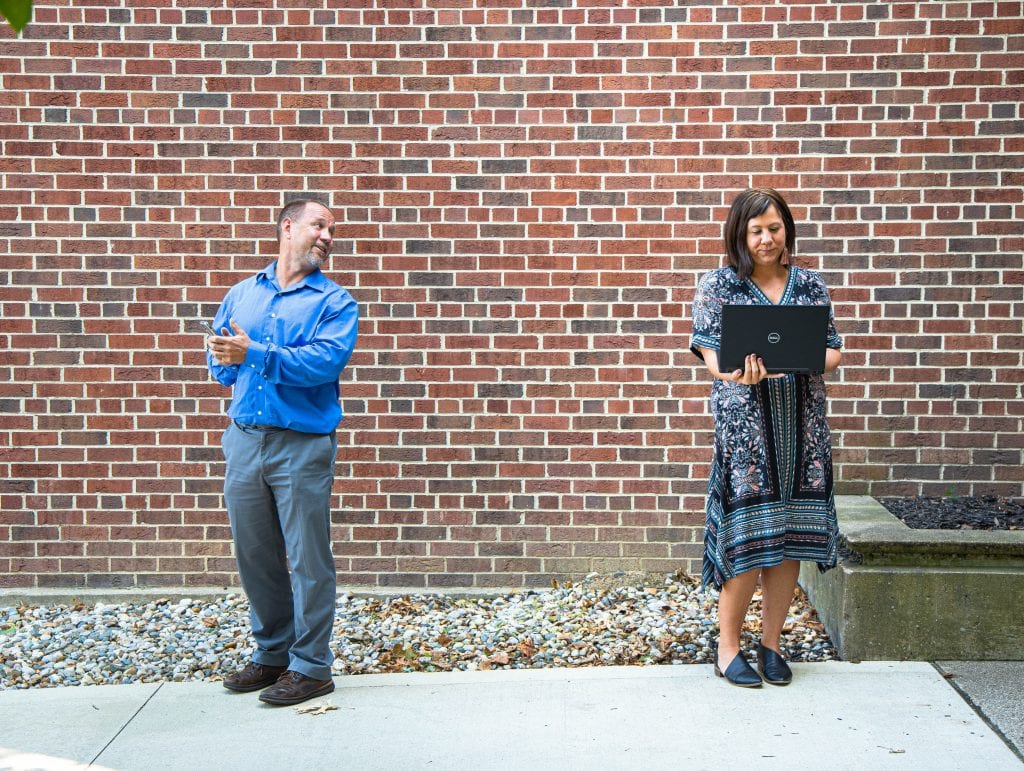
Q + A with Matt and Heidi: Digital Marketing College Professors

Digital Marketing Professors Matt Metzger and Heidi Miller have shared more than just a love for digital marketing — they used to share a last name! That’s right! We sat down with this sibling pair and asked them questions about their experiences prior to teaching at a digital marketing college, current marketing trends, digital marketing degree programs, and more!
How did you get involved in digital marketing? How did you use it prior to teaching it?
Heidi: Before teaching marketing, I was the Director of Marketing for a financial company, Next Level Financial Management, which was in the Indianapolis area at the time. I also was a realtor with a large group in the Carmel area, where we utilized digital marketing to help increase our sales and gain attention in the market. I was in real estate during the 2008-2009 financial crisis, so marketing ourselves was a huge part of our success.
I have been teaching marketing as an adjunct professor since 2006 and full-time since 2011, with a break to work in career services. Most of the classes that I taught were in the marketing field, but they mainly involved traditional marketing. Colleges with a digital marketing major were rare. But I knew that digital marketing was growing, so I asked Ivy Tech, where I was an Assistant Professor of Business, if I could create a digital marketing class. My dean told me if I could find enough students to enroll in the class, they would let me develop the course and teach it. I filled the class up, developed the class from scratch, and made it available to the school. The class was a hit, and I knew I wanted it to emphasize traditional marketing as well as digital. I’ve developed several other traditional marketing classes as well, and I incorporate digital marketing into them.
Matt: While operating Metzger Outdoors, at the very infancy of social media, we were just mailing letters. But then we started to realize the value of social media. We said, “This is a powerful way to get the word out to a lot of people!” People actually started sharing what we posted. Then we started doing email marketing, developed a mailing list, and could advertise that way.
I also worked for many years at Metzger Trucking. At first, we were questioning why we even had to have a website, but then we started email marketing and doing Youtube videos that featured our excellence in transportation. Through these videos, we showed how we differentiated ourselves from any other company visually with nice trucks and trailers, and how our employees treated our customers.
Finally, when I came here as the Director of Marketing, we weren’t using social media other than through outside vendors. Two years ago we brought our social media management to an internal position. And now we do it all — analytics, SEO, content, email marketing, and blog posts.
Why is digital marketing important? And who is it important for?
Heidi: It’s important for everyone! It’s important because digital marketing has enabled businesses to interact with targeted audiences in real-time. A target audience can be reached cost-effectively and measurably. It also can help increase brand loyalty and online sales. Digital marketing is not going away, and we all use it in one way or another. The rise of digital media has entirely transformed businesses, so we need to understand it and embrace it.
Matt: There are some businesses that are still not using social media today. They’re going to be left in the dust. Digital marketing is important for everyone. There’s not a person I know that’s not affected by digital marketing. Email marketing, especially, has a wide reach from kids to the elderly. If we’re not using it in our marketing, we’re in trouble. That’s why our digital marketing major at Grace is so important. It provides hands-on training for students to master the skills needed to use this powerful tool.
How have you seen digital marketing evolve over your lifetime? How has COVID and the current context shaped this field?
Heidi: It has become more and more critical since 2007 with the first iPhone. I have seen SEO evolve in the past fifteen years. Viral marketing and influencer marketing, and mobile marketing have all increased as well.
The emergence of COVID-19 has altered the way we all live and work, and that includes digital marketing. Businesses have either made the best of the situation or gone under. Strategies like curbside and family-style services are dependent on digital marketing to reach out to customers. Digital marketing has been critical with e-commerce as well, which has grown in leaps and bounds. Digital marketing allows companies to stay in touch with their customers which is crucial at this time.
Matt: There were companies that weren’t ready to handle COVID because they didn’t have a digital marketing plan in place. Amazon, Walmart, Target, Grace College — these companies were able to adapt very quickly. Over our lifetime, digital marketing has gone from nonexistent to being everywhere. I can remember having arguments about why we need email when we have a fax machine. Or why we need a website. Now there are very few companies that don’t have one. It’s changed dramatically!
There was about a 20% to 30% jump in social media usage when COVID hit. We pivoted here at Grace, and sped up our virtual advertisement. We knew that people would be stuck in their houses and we would need to deliver ads to them quickly. Grace is a savvy digital marketing college, and I think it’s one of the contributing factors to why we saw great enrollment following a global health pandemic.
If you could provide one piece of advice to smaller businesses or nonprofit organizations in regards to digital marketing, what would that be?
Heidi: Utilize it, be creative, and be adaptable. Take advantage of free resources, including the Small Business Administration — they offer free classes in digital marketing. There are so many free digital marketing certifications like HubSpot and e-marketing. A lot of businesses don’t want to change, but they need to adapt and let go of control.
Matt: If you aren’t using it, start using it. A lot of companies reach out to us asking for help with where to start. And that’s why we’re developing students who can do that!
People are evaluating people and organizations based on their social media profiles, now a lot more than ever. If I want to work for a company, I’m going to go look at their Instagram profile. I can tell a lot from their profile and base my opinion on the quality of their pictures and the story that they’re telling. People are savvy, they make their judgments based on quality digital marketing.
Compared to other colleges with a digital marketing major, what is the core objective of Grace’s program?
Heidi: To teach students digital marketing strategies and technology platforms. To shape and send them to make an impact in the digital marketing field. Digital marketing is great, but we need Christ-followers to set examples. Some things online are just disturbing and empty. It’s important that digital marketing colleges send Christians out who can execute well and get impressive results without stooping to the level of some of the influencers.
Matt: There are very few private Christian colleges with a digital marketing major, so we’re on the cutting edge in the digital education space. But we can’t use digital marketing by itself, it has to work in conjunction with traditional marketing to be effective. In the digital marketing major, you have to know the principles of psychology — what makes people do what they do. Our school is a little different because we don’t just teach theory, we do actual business in the classroom. In one class, we set up social media advertisements for five different businesses. Students graduate with a portfolio that they can put in front of an employer, which includes the HubSpot email certification and the Google Analytics certification.
What do digital marketing students get at Grace that they may not get at other digital marketing colleges?
Heidi: Students get smaller classes, real-world experiences, and opportunities for applied learning and internships within the community and surrounding communities.
Matt: They will be immediately ready to jump into the field. They don’t have to have additional training after they graduate. They’ll be able to sit down at their first job post-grad and execute a comprehensive digital marketing campaign.
Are you ready to jump into the ever-changing world of digital marketing? Learn more about our digital marketing college program!
Previous Post

